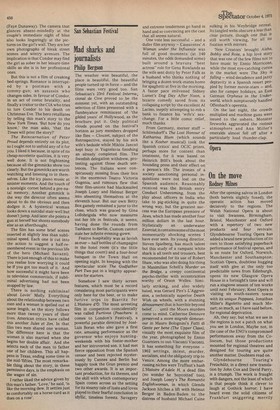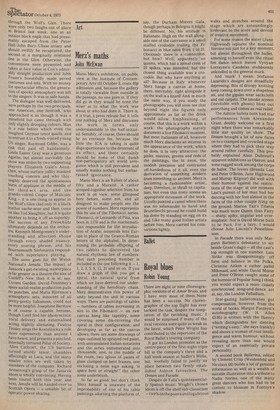Opera
On the move
Rodney Eines
After the opening salvos in London (both barrels slightly foxed), the operatic action has moved decisively to the regions. The Welsh National Opera is about to visit Swansea, Birmingham, Bristol, Manchester and Oxford with a repertory of two new products and four revivals; Glyndebourne Touring Opera has added a brand new production of its own to those satisfying paperback performance of festival operas, and is en route for Oxford, Norwich, Manchester and Southampton; Scottish Opera, doubtless hugging itself with glee at the only too predictable news from Edinburgh, opens its new Glasgow Opera House in a fortnight's time and will run a stagione season of ten works until next February; Kent Opera is visiting six south-eastern towns with its unique Poppaea, Jonathan Miller's Rigoletto and much Mozart; so much, as I have said before, for regional deprivation.
Ah, they say, but what we see in the regions is not a patch on what you see in London, Maybe not, in the case of the ENO's compromised performances away from the Coliseum, but those productions mounted for regional theatres and designed for touring are quite another matter. Doubters read on.
Glyndebourne Touring's Freischtitz, in a direct new translation by John Cox and David Parry, is a triumph. The work is fraught with dangers, not the least of which is that people think it clever to laugh at Gothick horror; I have heard even the solid citizens of Frankfurt sniggering merrily through the Wolf's Glen. There were only two laughs out of place in Bristol last week, one at an outsize black eagle that had presumably escaped from the Peter
Hall/John Bury/ Ulisse aviary and Should swiftly be recaptured, the
second at a marginally mistimed line in the Glen. Otherwise, the conventions were presented and taken at face value in Cox's admir ably straight production and John Fraser's beautifully made period costumes and sets. With no money for spectacular effects, the generation of spooky atmosphere was left to the singers. It was in safe hands.
The dialogue was well delivered, save perhaps by the two principals, one American, one Scottish, who approached it as though it was a minefield but came through with only slightly drooping colours. Max is a role before which even the toughest German tenor quails, and to entrust it to a fresh-voiced young US singer, Raymond Gibbs, was a risk that paid off handsomely. Linda Easter Gray was a generous Agathe, but almost inevitably the Show was stolen by two supporting Players: Elizabeth Gale's Aennchen, whose surface jollity masked touching concern and who thoroughly deserved the spontaneous burst of applause in the middle of her third-act aria, and the granite-voiced Caspar of Malcolm King — it is one thing to appear in the Wolfs Glen clad only in a black leather cache-sexe and then come on like Tod Slaughter, but it is quite another to bring it off so superbly. The success of any Freisch Utz ultimately depends on the orchestra; Kenneth Montgomery's understanding and affection shone through every shaded nuance, every soaring phrase, and his Bournemouth Sinfonietta responded with superlative playing.
The same goes for the Welsh National's Jenufa. The impact of Janacek's gut-twisting masterpiece is far greater in a theatre the size of Cardiff's New than it is at, say, Covent Garden. David Pountney's spare social-realist production pulls no punches, and Maria Bjornson's atmospheric sets, innocent of all Pretty-pretty folksiness, could not be more helpful. Josephine Barstow is of course a capable heroine, though I still find her idiosyncratic vocal delivery and externalised acting slightly alienating. Pauline Tinsley sings the Kostelnicka's role more expressively than anyone I have heard, and presents a pinched, internally tortured Pillar of Society. Allen Cathcart, the US baritone turned sturdy tenor, shambles affectingly as Laca, and the many smaller roles are well taken by members of the company. Richard Armstrong's grasp of the Janacek idiom is wholly convincing. Having been toured both this year and next, Jenufa will be handed over to Scottish Opera — a sensible bit of operatic power-sharing,



































 Previous page
Previous page